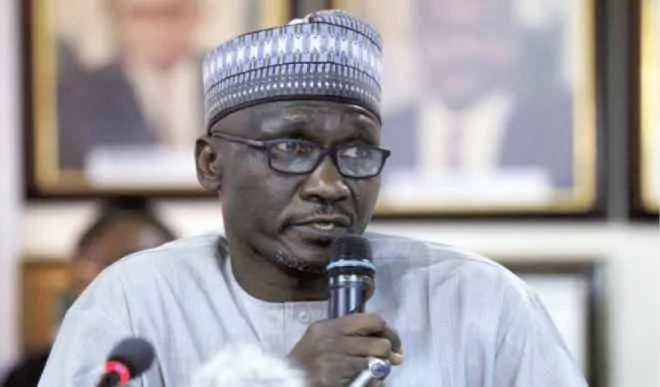The Nigerian National Petroleum Corporation has said that it recorded a total of 45,347 pipeline breaks on its downstream network between 2001 and mid-2019.
The Group Managing Director, Malam Mele Kyari, stated this at the Nigeria International Pipeline Technology and Security Conference in Abuja.
Kyari spoke as a Guest Speaker on the theme: “Pipeline Assets, Critical Backbone to Socio Economic Development.”
He said: “Between 2001 to half year 2019, NNPC has recorded a total of 45,347 pipeline breaks on its downstream pipeline network.
“The cost of vandalism, which includes fatalities, loss of revenue, asset and environmental degradation, affects everyone.
“Lost revenue, possible loss of employment, collateral damage to national image, loss of investor confidence, etc will obviously affect everyone in the long run.”
The GMD also said in 2018, a total of 19 fire incidents were recorded on the petroleum products pipelines.
This, Kyari said, remained a challenge stakeholders must come together to find a lasting solution to, in order to end the menace.
Kyari said the importance of pipelines could not be over emphasised, adding that when there are no pipelines to transport petroleum products, the alternative is to transport by trucks.
He said the high number of trucks involved in daily transportation of products over long distances contributed to highway accidents and deterioration of the nation’s road network.
“Based on Federal Road Safety Corps estimate, Nigeria has lost about N7.157 billion to road traffic accidents involving 116 petroleum product tankers during the first half of 2018,” he said.
He called on all stakeholders, including pipeline professionals, communities, government institutions and industry players, to tackle the menace.
Kyari said the corporation would deploy technology, physical deterrent interventions and other soft options to arrest the menace.
He noted that some progress had been made over the last three years, but more work needed to be done.
He said: “We have sustained awareness campaign, removed illegal structures on pipeline rights of ways, and we are deploying appropriate technology to mitigate attacks on pipelines as well as to reduce our response time to incidents.”
Commenting on gas projects, Kyari said the Administration of President Muhammadu Buhari was determined to boost domestic gas utilisation to improve power generation and spin up industrial growth.
He added that as part of the trans-Nigeria gas pipeline network, the Abuja-Kaduna-Kano gas pipeline project was already underway.
According to him, the project, a 612km gas pipeline, has the capacity to deliver two billion cubic feet of gas to fuel three new gas-driven power plants with generation capacity of 3,600MW.
He said: “This presents a huge opportunity for pipeline professionals and other Nigerians for the various economic benefits of the project.
“May I use this opportunity to call on the members of the Pipeline professionals Association of Nigeria to maintain professionalism and promote ethical conduct in delivery of service to the oil and gas industry.”
The GMD reassured that the corporation would work with PPAN to improve reliability of the pipeline network to find lasting solution against the menace of pipeline vandalism.
In his remarks, the Chairman of PPAN, Jeff Onuoha, said that pipeline remained the backbone in the business of oil and gas.
Onuoha said there was urgent need to secure the nation’s pipeline network to ensure economic growth and development.
“If you don’t have pipeline to transport products, you don’t have any business, because you cannot evacuate without good pipeline network,” he said.
Onuoha said it was unfortunate that pipelines remained vulnerable in spite of their huge importance to the oil and gas business, and all hands must be on deck to protect them.
He said some technology like Anti Tamper Lock developed by the professionals were needed to ensure security of the pipelines in the country.
Also, in his remarks, Chidi Izuwa, Director General, Infrastructure Concession Regulatory Commission, said infrastructure development remained key to development.
Izuwa said Nigeria required billions of dollars annually to tackle its infrastructure challenge and to achieve this, there was the need to adopt Public Private Partnership.
Trending
- Governor Adeleke flags off new Osogbo Stadium, unveils sport agenda
- Lagos ends remote work for public servants
- Fasting: UMA pre-Ramadan lecture will enrich knowledge, add value — President
- Shell sees bright future for Nigeria’s deep-water production with the right conditions
- Ogbuku restates NDDC’s commitment to complete ongoing projects
- Dangote Refinery reduces diesel price by N55 per litre
- 3,000 Nigerians join YP4T to build stronger youth-led movement
- Sahara Energy Geneva applauds traders for supporting Mercy Ships, advancing SDGs


